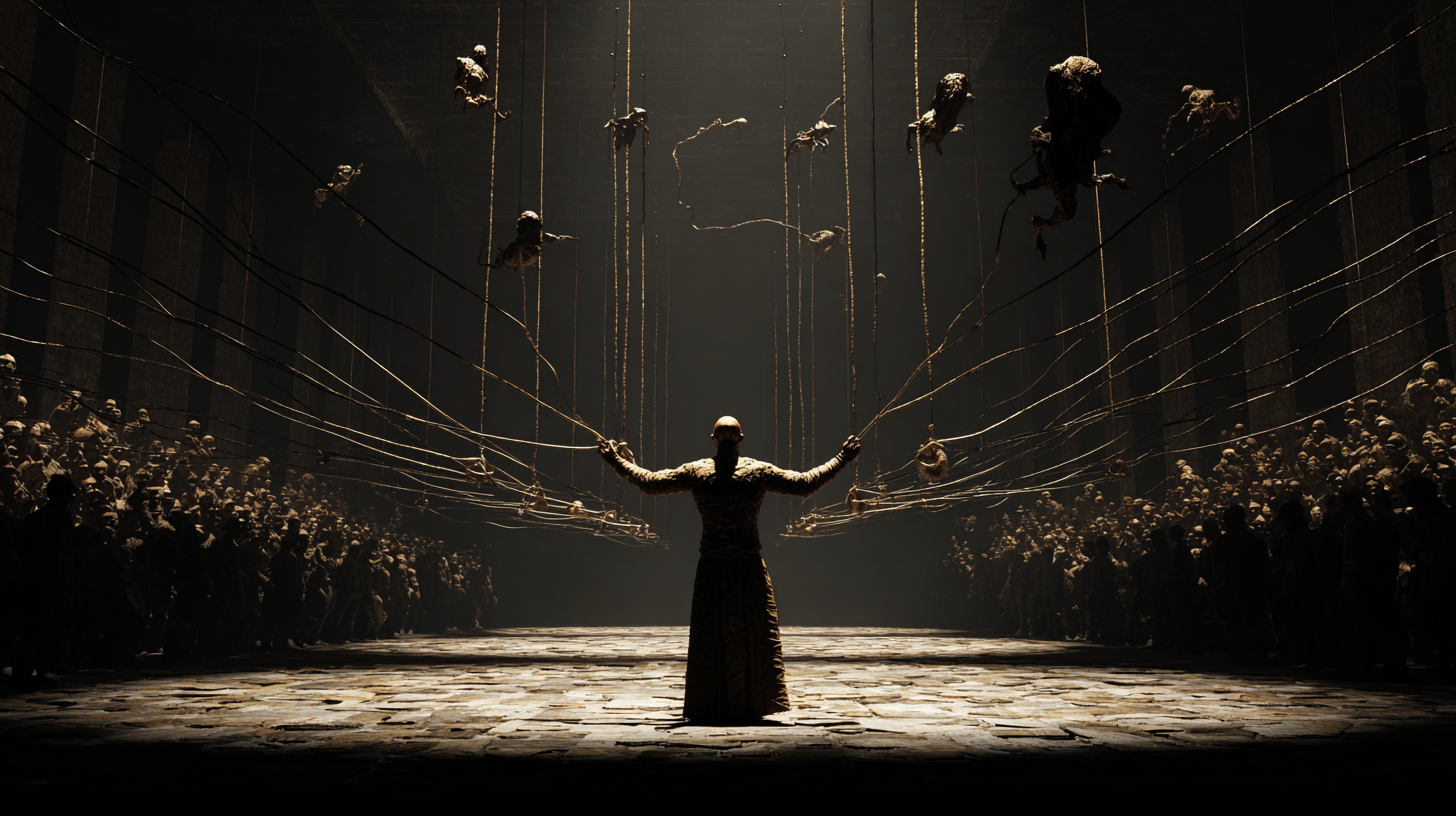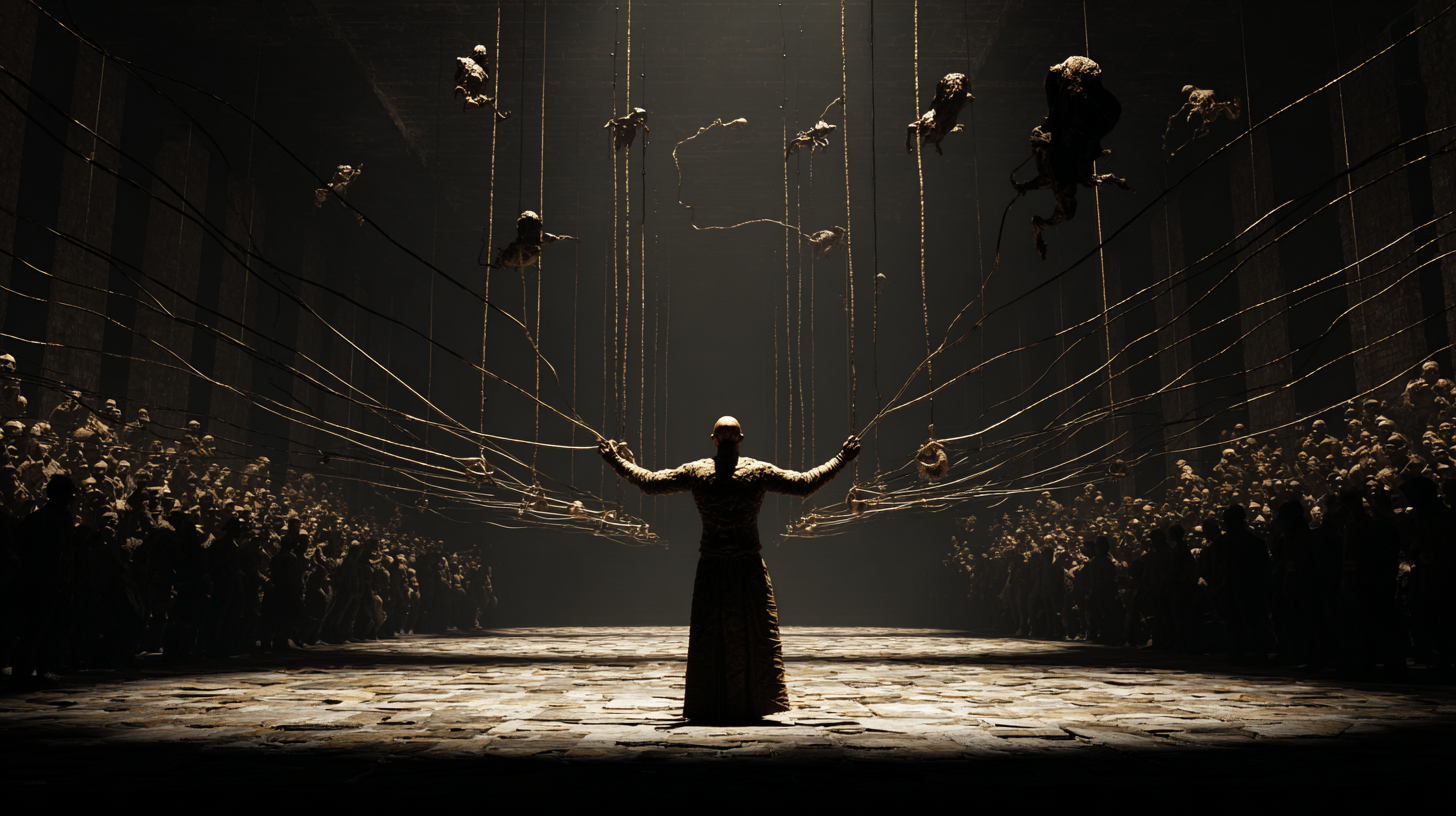The Seventh Mirror: The Leader's Theatre
What if the enemy is a phantom created to control you? A visionary excerpt from The Book of Korm reveals the leader's oldest trick and shows that real freedom is found not in fighting the performance, but in leaving the theater entirely.


On the seventh night, the number of completion, he found himself drawn not to his library or treasury, but to the great assembly hall where he had once addressed his lieutenants and received emissaries. The vast space echoed with the ghosts of his own speeches, the phantom applause of those who had hung on his every word.
As the Tiger's fire rose in him, the hall transformed into something far more terrible: a cosmic amphitheater where the same play had been performed since the beginning of time.
A vision seized him with the force of revelation:
On the stage stood a figure that was somehow every demagogue who had ever lived; a composite shadow wearing a thousand faces. The Leader spoke with the voice of absolute certainty, his words creating reality as he spoke them:
"They are coming for us!" he declared, and suddenly, in the darkness beyond the stage lights, shapes began to move; formless, threatless, but made threatening by his naming.
"They want to destroy our way of life!" he continued, and the audience gasped as their ordinary lives suddenly seemed precious and precarious.
"Only together can we defeat them!" he roared, and the crowd pressed closer, finding in their proximity the illusion of power.
But the Tiger's fire let the Witness see what the audience could not: The Leader was hollow. Not metaphorically, but literally; a shell of rhetoric animated by the crowd's need for meaning. Inside his chest was not a heart but a mirror, reflecting back the audience's own fears in magnified, distorted form.
The "enemy" he pointed to was a puppet on strings that led back to his own hands. He created the threat with one hand while offering protection with the other. His arguments made no sense: "We must eat stones because the water is blue," "We must burn books because the harvest was good," but the crowd nodded, hypnotized by the rhythm of certainty rather than the content of reason.
Then the Witness saw the most terrible truth: The Leader needed this enemy more than food or water or air. Without it, he would literally cease to exist. He was not a being but a process: the process of creating opposition. Every peace treaty was a death sentence. Every resolution was dissolution. He could only live in the space between "us" and "them."
In the vision, a single person in the audience, a young man, suddenly stopped watching the stage and looked around. He saw his neighbors' faces, slack with manufactured rage. He saw the strings connecting the Leader to his phantom enemies. He saw the hollow space where his soul should be.
Without a word, he stood and walked out of the amphitheater. He didn't join the "enemy." He didn't become a new leader. He simply left the theatre entirely, walking into a darkness that was more honest than the false light of the stage.
The vision released him, and he found himself on his knees in his own assembly hall, weeping for every time he had stood on that stage, creating enemies to unite his followers, feeding on their need for direction while giving them only the circular path of perpetual conflict.
With trembling hands, he wrote the seventh parable, brutal in its efficiency:
One person watches a leader speak. After some reflection, he notices how his arguments are non-sequiturs and self-fulfilling. Fear is the motivating force: the leader needs an enemy to unite his base. This person sees the hollowness and chooses a new path.
Four sentences. That was all it took to diagnose the disease that had infected every civilization since the first chief pointed to the darkness beyond the fire and said, "They are out there, waiting to destroy us."
He understood now that he had been this Leader, creating phantom enemies to maintain his authority. His "optimizations" had always required something to optimize against. His "efficiencies" had always needed inefficiency to correct. He had been hollow, animated only by the problems he created in order to solve them.
But the parable's hope lay in its singular observer; one person who stopped, reflected, and saw through the performance. Not a mass awakening, not a revolution, just one individual choosing to step outside the theatre entirely. That was how it always began; one person at a time, seeing the strings, recognizing the hollowness, choosing a new path that couldn't be defined because defining it would make it just another ideology to follow or oppose.
This parable is an excerpt from the forthcoming work, The Book of Korm: After Zarathustra.
Author
Sign up for The (all) Unknowing newsletters.
Stay up to date with curated collection of our top stories.